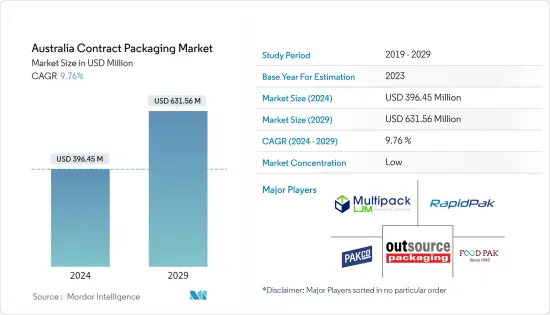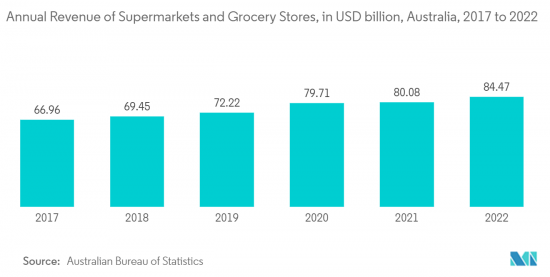PUBLISHER: Mordor Intelligence | PRODUCT CODE: 1408837

PUBLISHER: Mordor Intelligence | PRODUCT CODE: 1408837
Australia Contract Packaging - Market Share Analysis, Industry Trends & Statistics, Growth Forecasts 2024 - 2029

The Australia Contract Packaging Market size is estimated at USD 396.45 million in 2024, and is expected to reach USD 631.56 million by 2029, growing at a CAGR of 9.76% during the forecast period (2024-2029).
Key Highlights
- In recent years, contract packaging services in Australia have witnessed significant growth, owing to the changing preference of manufacturing firms toward contract packagers, as they increasingly focus on cost optimization to enhance their core competency. Many industry experts claim that these services can reduce operational costs by 7-10% due to the reduced maintenance costs of machines and labor costs.
- Supply chains, notably in the end-user industries, faced significant disruption and difficulty during COVID-19 when governments closed their borders or imposed trade restrictions. On the other hand, sales through online retail channels significantly contributed to market penetration. The increased demand from the food and beverage and pharmaceutical industries was further fueled by the pandemic. The growth of the e-commerce industry in Australia is expected to be one of the major factors driving the Australian contract packaging market.
- Packaging regulations are evolving rapidly, especially for food and beverage products. Meeting such stringent rules and norms requires several inspection and quality check operations. By outsourcing packaging activities, the hectic task of meeting such regulations (also known as mil-spec packaging) is passed on to the contract packaging agency, motivating more manufacturers to prefer contract packages over in-house packaging activities. According to the article published by the Food Packaging Forum in Australia in August 2023, Australian environment ministers have agreed to reduce the use of toxic chemicals in food packaging, develop packaging design guidelines and objectives, and harmonize curbside recycling schemes. Several new packaging guidelines across the country are likely to strengthen the demand for contract packaging across the country.
- However, contract packaging can be time-consuming, as products are transported several times between manufacturers and packagers, thus increasing the potential for damage. In the case of a liquid product, the percentage would be higher since damage to one bottle can destroy multiple cases. The Australian contract packaging market is witnessing stringent demand from in-house packaging manufacturers.
- The growth of the e-commerce sector in Australia is also emerging as one of the major factors driving the market's growth. This trend also motivates contract packaging and logistic companies to utilize the packing opportunity to gain control over the value chain.
Australia Contract Packaging Market Trends
FMCG Domain Remains a Key Driver for Growth of Co-Packing Services
- FMCG products often experience seasonal fluctuations in demand, such as during festivals or specific promotional periods. Contract packing services allow businesses to scale up or down their packaging operations based on these fluctuations without investing in additional infrastructure or labor.
- According to the Australian Bureau of Statistics, Australian supermarket and food retail industry annual sales increased year-on-year from 2017 to 2022 and increased significantly from 2021 to 2022. In 2022, the sales reached a value of more than AUD 132 billion (USD 93.4 billion). Growth in sales at supermarkets and grocery stores shows that demand for FMCG goods is increasing. As retail sales increase, the production and distribution of FMCG goods are also likely to increase. This increased product volume often requires more efficient and scalable packaging solutions, which a contract packaging service can provide.
- With the increasing revenue in the FMCG sector, companies are likely looking for cost-efficient ways to manage their packaging needs. Contract packaging services can offer economies of scale and cost savings by outsourcing packaging operations, allowing FMCG businesses to allocate resources more efficiently.
- In the quarter ending June 2023, the gross operating profit of businesses in the retail trade industry in Australia amounted to approximately AUD 8.18 billion (USD 5.27 billion) compared with June 2019, when the gross operating profit of businesses in the retail trade industry was AUD 5.18 billion (USD 3.34 billion). The FMCG sector is highly dependent on effective supply chain operations. As the retail industry grows, companies may need to adjust their supply chain strategies to meet the increasing demands. Contract packaging services can provide specialized packaging and distribution services to enhance supply chain productivity.
- The growth in the retail trade industry in Australia signifies a growing demand for FMCG products, which can be advantageous for contract packing services. These services can assist FMCG companies in adapting to changing market conditions, improving supply chain efficiency, and delivering customized packaging solutions, ultimately contributing to the FMCG sector's growth and success.

Food Industry to be the Largest End User
- The need for various industries, such as food and beverage, is projected to favorably affect the contract packaging industry. The demand for packaging to carry these products will rise as more individuals buy from supermarkets, grocers, and other retail establishments. According to the Australian Bureau of Statistics, the annual revenue of supermarkets and grocery stores was AUD 125.85 billion (UD 80.24 billion) in 2021, reaching AUD 132.75 billion (USD 84.64 billion) in 2022. Such revenue growth in supermarkets and grocery stores is expected to drive the contract packaging market.
- Australian food and beverage production is a significant economic and employment contributor to the country. Due to the high quality of the items it generates, the sector is appealing to Australian exporters. The meat, fresh vegetable, and processed food industries are witnessing growth. Health and wellness trends continued to support the development of fresh food produced nationwide. The contract packaging market is anticipated to benefit from expanding Australia's food and beverage sector as retailers and consumers look for packaging options that meet their requirements. The demand for inventive and environmentally friendly packaging grows as the industry develops and adjusts to shifting consumer expectations.
- Consumers in Australia are increasingly concerned about the environmental impact of food packaging. As a result, there is a growing shift toward sustainable packaging materials and practices. A study by the Australian Packaging Covenant Organization (APCO) reported a 15% increase in the use of recyclable and eco-friendly materials in food packaging between 2020 and 2022.
- Veolia's recent research has uncovered that 80% of Australians are influenced in their purchasing decisions by the composition of a product's packaging. 62% of the population expresses their willingness to pay a higher price for everyday consumables if it guarantees that the packaging will not end up in a landfill. 89% of individuals believe that manufacturers should be obligated to use recyclable product packaging. These trends reflect the evolving consumer landscape and stringent regulatory requirements, prompting food manufacturers to seek specialized contract packaging services.
- The capacity to package uncooked food in climate-controlled, refrigerated, and frozen products/conditions, combined with a highly automated secondary co-pack plant, presents a unique opportunity to the market. Transforming into an all-inclusive supplier allows customers to minimize their supply chain and lessen their dependence on imported products. Customers are requesting a more extensive range of products and those that are considered "better for you." The growth of this market is accelerating due to social media. Contract packaging offers the possibility of launching several new products on a small scale to determine their viability and then scale up successful launches to full national rollouts.
Australia Contract Packaging Industry Overview
The Australian contract packaging market is fragmented with the presence of major players like Multipack-LJM (Probiotec Limited), Rapid Pak, PakCo, Outsource Packaging, and FoodPak. Players in the market are adopting strategies such as partnerships and acquisitions to enhance their product offerings and gain sustainable competitive advantage.
In April 2023, Joint venture developers Frasers Property Industrial and Aware Real Estate secured Probiotec, one of the industry leaders in the contract manufacturing and packing space for pharmaceuticals, for a built-to-suit 29,808 sqm facility on a 15-year lease at The YARDS, a Premium Estate at Kemps Creek in New South Wales. Probiotec would consolidate its packaging operations across the company at the architecturally-designed facility, including a 1,118 sqm office mezzanine.
Additional Benefits:
- The market estimate (ME) sheet in Excel format
- 3 months of analyst support
TABLE OF CONTENTS
1 INTRODUCTION
- 1.1 Study Assumptions and Market Definition
- 1.2 Scope of the Study
2 RESEARCH METHODOLOGY
3 EXECUTIVE SUMMARY
4 MARKET INSIGHTS
- 4.1 Market Overview
- 4.2 Industry Attractiveness - Porter's Five Forces Analysis
- 4.3 Industry Ecosystem Analysis
- 4.4 Impact of the Recent Geopolitical Changes on the Global Contract Packaging Industry
- 4.5 Industry Standards and Regulations
5 MARKET DYNAMICS
- 5.1 Market Drivers
- 5.1.1 FMCG Domain Remains a Key Driver for the Growth of Co-packing Services
- 5.1.2 Growing Emphasis on Outsourcing Non-core Operations By Product Manufacturers in Australia to Drive Demand
- 5.2 Market Challenges & Risks
- 5.2.1 Need for Constant Investments in Quality Management and Accreditations Remains. A Major Challenge for Potential Entrants as Large Firms Have a Considerable Advantage
- 5.2.2 Competition from In-house Packaging Key Verticals
- 5.2.3 Evolution of Contract Packaging and Fulfillment Services in Australia
6 CONSUMER GOODS INDUSTRY LANDSCAPE IN AUSTRALIA
- 6.1 Current Market Scenario
- 6.2 Import/Export Outlook
- 6.3 Onshoring/Offshoring Trends and Case Studies
7 MARKET SEGMENTATION
- 7.1 By Type
- 7.1.1 Primary
- 7.1.2 Secondary
- 7.1.3 Tertiary
- 7.2 By End-user Type
- 7.2.1 Food
- 7.2.2 Beverage
- 7.2.3 Pharmaceutical
- 7.2.4 Home Care and Personal Care
- 7.2.5 Other End Users
- 7.3 By Service Type
- 7.4 By Material
8 COMPETITIVE LANDSCAPE
- 8.1 Company Profiles
- 8.1.1 Multipack-LJM (Probiotec Limited)
- 8.1.2 Rapid Pak
- 8.1.3 PakCo
- 8.1.4 Outsource Packaging
- 8.1.5 FoodPak
- 8.1.6 HH Packaging (Probiotec Limited)
- 8.1.7 UltraPak (Australia) Pty Ltd
- 8.1.8 Finishing Services Pty Ltd
- 8.1.9 Chemical Solutions
- 8.1.10 Tripak Pharmaceuticals
- 8.1.11 Probiotec Pharma (Probiotec Limited)
- 8.1.12 Australian Blister Sealing Incorporated Pty Ltd (Probiotec Limited)
9 VENDOR MARKET SHARE ANALYSIS - AUSTRALIA CONTRACT PACKAGING
10 INVESTMENT ANALYSIS
11 FUTURE OF THE MARKET




